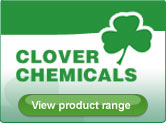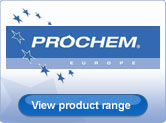Disposable gloves - what kind do I need?
 Thursday, September 3, 2009 at 9:19AM
Thursday, September 3, 2009 at 9:19AM  Disposable gloves are essential wear for many cleaning tasksThe glove industry is worth over $1 billion a year. And it's not surprising, since everyone needs suitable hand protection. Purchasing gloves seems a simple job, but the choice is so extensive that it can quickly turn into an overwhelming task. Many users wear gloves for prolonged periods of time, so comfort is very important, as is tactile sense. The gloves may be in contact with chemicals and irritants, so cleanliness and protective ability are factors too.
Disposable gloves are essential wear for many cleaning tasksThe glove industry is worth over $1 billion a year. And it's not surprising, since everyone needs suitable hand protection. Purchasing gloves seems a simple job, but the choice is so extensive that it can quickly turn into an overwhelming task. Many users wear gloves for prolonged periods of time, so comfort is very important, as is tactile sense. The gloves may be in contact with chemicals and irritants, so cleanliness and protective ability are factors too.
With all this in mind, what gloves should you be buying?
Well, it depends on the task at hand. Here are the main types of glove material, and what you should use them for.
Natural Rubber Latex
Natural Rubber latex gloves have been historically very popular, although they have recently lost some market share to nitrile. They are elastic and durable, come in a variety of thicknesses, but tend to wear away and flake after prolonged usage. Nitrile's antistatic qualities are also far superior. Latex has some re-seal properties when punctured, but this is temporary at best. Latex gloves are used extensively in the food service, dental, automotive and medical industries.
Nitrile
While more expensive than latex, nitrile has advantages. It has superior natural resistance to a range of chemicals and irritants and is three times more puncture-resistant than latex or vinyl. Nitrile is also naturally antistatic and can reduce hand fatigue when worn for long periods due to its natural ability to form to the hand's shape. Nitrile gloves are suitable for those allergic to latex, and are frequently used in the healthcare and medical industries where puncture-resistance and high levels of tactile sensation are important. However, nitrile gloves are generally thicker than latex gloves which can reduce tactile sensation.
Polyurethane
Polyurethane is more expensive than other materials but is suitable for tasks that require ultra-thin gloves. They have very good chemical resistance and antistatic properties, but can tear easily. They are also beneficial for applications that require several glove changes. Low levels of extractables, irritants and allergens make the gloves suitable for medical jobs, but they can be uncomfortable to wear for prolonged periods due to their poor elasticity.
Vinyl
Vinyl is non-allergenic and antistatic and no powder is used in the production process, making them ideal for a medical environment where powder-less gloves are essential. Vinyl gloves are also the cheapest option, but vinyl does not like moisture, so is best used for tasks conducted in dry environments. Fingernails may puncture the material, so it is best avoided when working with irritants. The gloves can also be loose fitting and offer poor acid resistance.
We stock a range of gloves for all your needs, and offer discounts for bulk purchasing. Check out our range of disposable gloves online or give us a call on 0845 680 1955.
 disposable gloves in
disposable gloves in  advice,
advice,  products
products 







Reader Comments